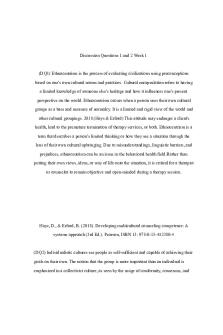Coatesville Address Discussion Questions PDF

| Title | Coatesville Address Discussion Questions |
|---|---|
| Author | Laura Horton |
| Course | Historical/Critical Research In Communication |
| Institution | Wake Forest University |
| Pages | 2 |
| File Size | 46 KB |
| File Type | |
| Total Downloads | 12 |
| Total Views | 159 |
Summary
Coatesville Discussion Questions...
Description
Laura Horton Coatesville Address Discussion Questions
1) What does Arthos mean by hermeneutics?
Arthos uses the term “hermeneutic” to mean “an anticipation of its own future life after death”. While “hermeneutics” typically means interpretations, Arthos uses the term to describe speech that is open-ended and self-reflexive. Rhetoric’s fundamental purpose is to make meaning known in and through an interpretive understanding; therefore, hermeneutics are functions of the rhetorical purpose.
2) Why does he focus on vision as the topic of his criticism of Chapman's Coatesville Address?
Arthos focuses on vision as the topic of his criticism because “vision is the engine of narrative comprehension that guides, forms, and informs the ethical journey”. He argues that active vision prompts the dissolution of the barriers the self erects. Vision is both the capacity to see, insight, and what is seen, spectacle. Arthos focuses on vision in regards to knowledge because the relation between image, reason, and designation are confounded, exemplifying the working of narrative as a performative understanding. He focuses on vision in regards to experience because there is an ontic relation between public and private understanding, depicting what is known as narrative understanding. Arthos focuses on vision in regards to injunction because there is an urgency to prevent the loss of the understanding that the vision gave him.
3) What does Arthos mean by a narrative ethic of engagement?
Arthos uses the phrase “narrative ethic of engagement” to mean the intersection of narrative and ethical theory, and the woven involvement of public and private. The active intention of the protagonist is to ensure a certain outcome. The protagonist uses language to show how personal experience exacts a responsibility, how a personal experience leads to an action, and how a personal experience interanimates the unfolding of a public experience. This is the way that personal experience leads to a commitment. The personal vision becomes public, and the protagonist shows the public how to respond to personal experiences that have public
Laura Horton implications. This linkage between personal and collective identity is therefore a narrative accomplishment. Furthermore, a person experiences a sense of belonging to the extent that he or she can interweave their interpretations with the interpretations of others through a narrative discourse. Ethical theory then intersects with narrative theory because it is human nature that a person’s conscience influences him or her to use his or her emotions for the purpose of seeing, interpreting, and becoming involved with the world in specific and meaningful ways.
4) Why is the distinction between public gaze and private reading important to Arthos?
The distinction between public gaze and private reading is important to Arthos because it is an important juxtaposition that teaches the audience the passage from private to public. The public is in the rhetorical act of commemoration while the private is in the narrative act of recounting. However, Chapman blends “I” and “we” in the recounting of the fourth paragraph to show the passage from private to public. It is the activity of individuals which founds the collective activity; therefore, the individual can claim ethical responsibility.
5) How does the Coatesville Address challenge our ideas about audience?
The Coatesville Address challenges our ideas about audience because it argues that there is a sense of social responsibility and solidarity. The address argues that the speaker uses language to show how personal experience interanimates the unfolding of a public experience for the audience. The audience is invited to visualize the speaker’s narrative and understand. The personal experience of the speaker then leads to a commitment from the audience. He argues that the speaker’s vision becomes the audience’s because there are public implications. Therefore, the audience has the responsibility to act as a collective. This challenges our ideas that an audience is separate from a speaker....
Similar Free PDFs

Discussion Questions
- 4 Pages

Discussion Questions
- 3 Pages

Discussion Questions Radiolab
- 1 Pages

Discussion Questions Other Wes
- 3 Pages

Discussion Questions 12
- 1 Pages

Accounting 102 discussion questions
- 25 Pages

Dbq - discussion based questions
- 8 Pages

Chapter 12 Discussion Questions
- 2 Pages

Discussion Questions Week1
- 2 Pages

Online Discussion Questions
- 6 Pages

Seminar-Discussion-Questions Answers
- 29 Pages

Unit 1 Discussion Questions
- 3 Pages
Popular Institutions
- Tinajero National High School - Annex
- Politeknik Caltex Riau
- Yokohama City University
- SGT University
- University of Al-Qadisiyah
- Divine Word College of Vigan
- Techniek College Rotterdam
- Universidade de Santiago
- Universiti Teknologi MARA Cawangan Johor Kampus Pasir Gudang
- Poltekkes Kemenkes Yogyakarta
- Baguio City National High School
- Colegio san marcos
- preparatoria uno
- Centro de Bachillerato Tecnológico Industrial y de Servicios No. 107
- Dalian Maritime University
- Quang Trung Secondary School
- Colegio Tecnológico en Informática
- Corporación Regional de Educación Superior
- Grupo CEDVA
- Dar Al Uloom University
- Centro de Estudios Preuniversitarios de la Universidad Nacional de Ingeniería
- 上智大学
- Aakash International School, Nuna Majara
- San Felipe Neri Catholic School
- Kang Chiao International School - New Taipei City
- Misamis Occidental National High School
- Institución Educativa Escuela Normal Juan Ladrilleros
- Kolehiyo ng Pantukan
- Batanes State College
- Instituto Continental
- Sekolah Menengah Kejuruan Kesehatan Kaltara (Tarakan)
- Colegio de La Inmaculada Concepcion - Cebu



